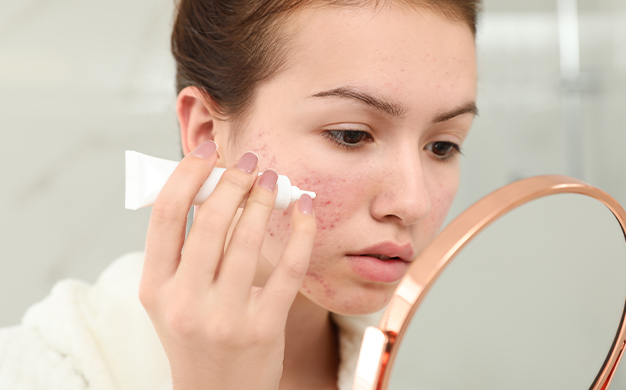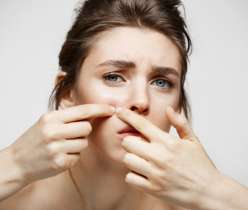Almost all teens get acne at one time or another. Whether teenage acne is mild or severe, there are things you can do to treat them. Read on to find out how to treat teenage acne with the help of acne medicines and other acne products.
What causes you to have acne?
Skin gets oilier, and zits sometimes pop up when puberty begins, and some may continue to get them throughout the teenage years. There are many misconceptions about what causes a breakout, but only three main causes exist.
- Heredity: Acne vulgaris can run in families. If any of your mother or father had severe acne as a teen, you would be more likely to get them.
- Hormones: You get more production of them during puberty. Hormones, known as androgens, trigger the oil glands on the face, upper chest, shoulder, and back to produce more oil. This can contribute to the formation of acne in some people. Moreover, some girls get more pimples before or during their periods. This is caused due to changes in the levels of hormones.
- Blocked skin pores– small whiteheads and blackheads can form when the pore in your skin gets plugged with oil. They can progress into the hard and bumpy pimples of acne.
What can you do?
- Don’t pop or squeeze: Popping or squeezing may open the lining of the oil ducts and make them redder and swollen. This can also lead to acne scars.
- Avoid scrubbing too hard: Scrubbing hard on acne-prone skin can irritate the skin further. Chin straps, headbands, and hats can irritate the skin.
- Do not use greasy makeup or skin care products: These can block oil ducts and cause worsening of acne.
- Learn to manage stress: Sometimes stress and anxiety can bring pimples. Try to manage your stress by getting adequate sleep and having enough time to relax.
- Ask your doctor about medicines: If you wish to use prescription medicine, ask your doctor if it can cause acne. Take a dermatologist’s advice on the best medicine to treat your acne.
Acne and contraceptive pills
Contraceptive pills, also known as birth control pills, are used to prevent pregnancy and can be useful for treating young women with acne. However, taking birth control pills with other medicines may be less effective. If you are taking the pill, speak to your doctor about how it might affect you.
Types of acne treatments
Unfortunately, there is no cure for teenage acne. However, acne usually clears up as you get older. In the meantime, there are a few things you can do to keep those pimples under control:
1. Benzoyl peroxide
Benzoyl peroxide preparations, including wash, lotion, or gel, are the most effective acne treatment you can get without a prescription. It helps to kill the acne-causing bacteria, unclogged skin pores and heal pimples. Topical benzoyl peroxide is available in different brands and strengths. The gel formulation may dry out your skin and make it red than the wash or lotion so try your hands on wash and lotion first.
How to use Benzoyl peroxide
Start slowly when it comes to using Benzoyl peroxide. Try using it once a day with a 5% wash or lotion. After a week, try using it twice daily if your skin does not appear too red or is not peeling.
Do not just dab it on your pimples. Apply an extremely thin layer to the entire area where pimples may occur. Avoid applying on the skin around your eyes and mouth.
If your acne does not improve after 4 to 6 weeks, you can try Benzoyl peroxide 10% gel or lotion. Use it once daily for a few days, then try twice a day if it doesn’t irritate your skin.
2. Retinoids
If benzoyl peroxide doesn’t help get your zits under control, your dermatologist may prescribe a retinoid formulation to be used on the skin (Retino A cream, A ret gel, or other brands). Tretinoin is the main active ingredient present in all these retinoid preparations that help unplug oil ducts. Retinoids can cause redness and peeling of the skin. Therefore, it must be used exactly as prescribed. Once you get the prescription for Retino A cream, buy online to get it at an extremely affordable rate. Similarly, you can buy other acne treatments online at the lowest price, including Benzoyl peroxide, salicylic acid preparations, and many more. You can also buy finacea gel online to treat your acne.
3. Antibiotics
Antibiotics: These can be used in lotions or gel forms for inflammatory acne. Your dermatologist may also prescribe oral antibiotics that may be used if the topical therapy alone doesn’t help.
Takeaway
Give each treatment enough time to work. Usually, it may take up to 3 to 6 weeks or longer before you see improvement and twelve weeks for maximum change in the appearance of acne. Follow your skincare treatment every day. Not using it regularly is the most common reason why treatment fails.



